新发展大学英语阅读与写作4课文翻译Reading for Pleasure为快乐而读书
大学英语4课文翻译
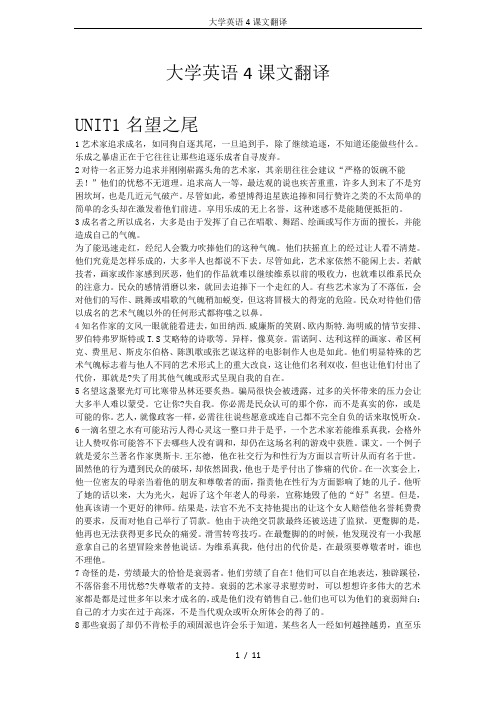
大学英语4课文翻译UNIT1名望之尾1艺术家追求成名,如同狗自逐其尾,一旦追到手,除了继续追逐,不知道还能做些什么。
乐成之暴虐正在于它往往让那些追逐乐成者自寻废弃。
2对待一名正努力追求并刚刚崭露头角的艺术家,其亲朋往往会建议“严格的饭碗不能丢!”他们的忧愁不无道理。
追求高人一等,最达观的说也疾苦重重,许多人到末了不是穷困坎坷,也是几近元气破产。
尽管如此,希望博得追星族追捧和同行赞许之类的不太简单的简单的念头却在激发着他们前进。
享用乐成的无上名誉,这种迷惑不是能随便抵拒的。
3成名者之所以成名,大多是由于发挥了自己在唱歌、舞蹈、绘画或写作方面的擅长,并能造成自己的气魄。
为了能迅速走红,经纪人会戮力吹捧他们的这种气魄。
他们扶摇直上的经过让人看不清楚。
他们究竟是怎样乐成的,大多半人也都说不下去。
尽管如此,艺术家依然不能闲上去。
若献技者,画家或作家感到厌恶,他们的作品就难以继续维系以前的吸收力,也就难以维系民众的注意力。
民众的感情消磨以来,就回去追捧下一个走红的人。
有些艺术家为了不落伍,会对他们的写作、跳舞或唱歌的气魄稍加蜕变,但这将冒极大的得宠的危险。
民众对待他们借以成名的艺术气魄以外的任何形式都将嗤之以鼻。
4知名作家的文风一眼就能看进去,如田纳西.威廉斯的笑剧、欧内斯特.海明威的情节安排、罗伯特弗罗斯特或T.S艾略特的诗歌等。
异样,像莫奈。
雷诺阿、达利这样的画家、希区柯克、费里尼、斯皮尔伯格、陈凯歌或张艺谋这样的电影制作人也是如此。
他们明显特殊的艺术气魄标志着与他人不同的艺术形式上的重大改良,这让他们名利双收,但也让他们付出了代价,那就是?失了用其他气魄或形式呈现自我的自在。
5名望这盏聚光灯可比寒带丛林还要炙热。
骗局很快会被透露,过多的关怀带来的压力会让大多半人难以蒙受。
它让你?失自我。
你必需是民众认可的那个你,而不是真实的你,或是可能的你。
艺人,就像政客一样,必需往往说些愿意或连自己都不完全自负的话来取悦听众。
大学英语泛读教程第四册全文翻译
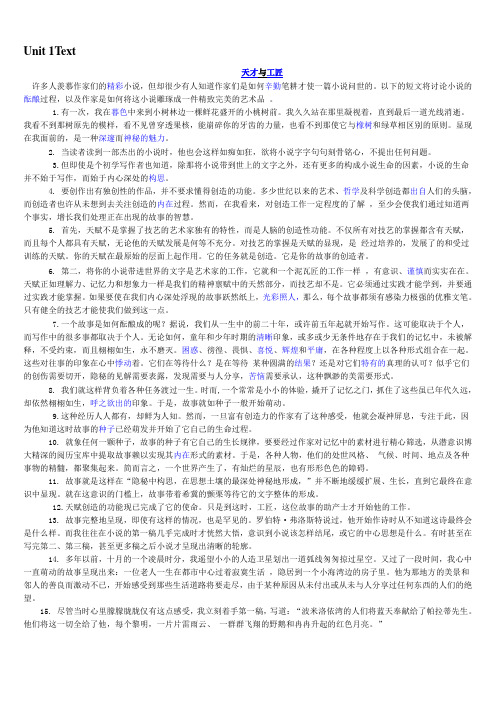
Unit 1Text天才与工匠许多人羡慕作家们的精彩小说,但却很少有人知道作家们是如何辛勤笔耕才使一篇小说问世的。
以下的短文将讨论小说的酝酿过程,以及作家是如何将这小说雕琢成一件精致完美的艺术品。
1.有一次,我在暮色中来到小树林边一棵鲜花盛开的小桃树前。
我久久站在那里凝视着,直到最后一道光线消逝。
我看不到那树原先的模样,看不见曾穿透果核,能崩碎你的牙齿的力量,也看不到那使它与橡树和绿草相区别的原则。
显现在我面前的,是一种深邃而神秘的魅力。
2. 当读者读到一部杰出的小说时,他也会这样如痴如狂,欲将小说字字句句刻骨铭心,不提出任何问题。
3.但即使是个初学写作者也知道,除那将小说带到世上的文字之外,还有更多的构成小说生命的因素,小说的生命并不始于写作,而始于内心深处的构思。
4. 要创作出有独创性的作品,并不要求懂得创造的功能。
多少世纪以来的艺术、哲学及科学创造都出自人们的头脑,而创造者也许从未想到去关注创造的内在过程。
然而,在我看来,对创造工作一定程度的了解,至少会使我们通过知道两个事实,增长我们处理正在出现的故事的智慧。
5. 首先,天赋不是掌握了技艺的艺术家独有的特性,而是人脑的创造性功能。
不仅所有对技艺的掌握都含有天赋,而且每个人都具有天赋,无论他的天赋发展是何等不充分。
对技艺的掌握是天赋的显现,是经过培养的,发展了的和受过训练的天赋。
你的天赋在最原始的层面上起作用。
它的任务就是创造。
它是你的故事的创造者。
6. 第二,将你的小说带进世界的文字是艺术家的工作,它就和一个泥瓦匠的工作一样,有意识、谨慎而实实在在。
天赋正如理解力、记忆力和想象力一样是我们的精神禀赋中的天然部分,而技艺却不是。
它必须通过实践才能学到,并要通过实践才能掌握。
如果要使在我们内心深处浮现的故事跃然纸上,光彩照人,那么,每个故事都须有感染力极强的优雅文笔。
只有健全的技艺才能使我们做到这一点。
7.一个故事是如何酝酿成的呢?据说,我们从一生中的前二十年,或许前五年起就开始写作。
大学英语4 课文原文及翻译 中英对照
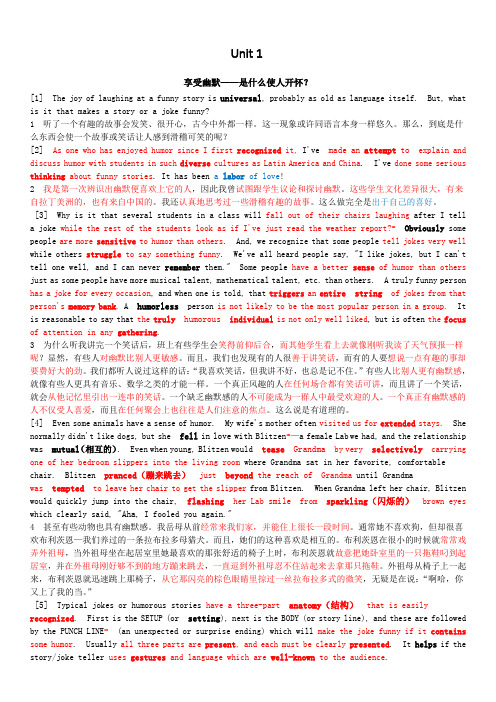
Unit 1享受幽默——是什么使人开怀?[1]The joy of laughing at a funny story is universal, probably as old as language itself. But, what is it that makes a story or a joke funny?1 听了一个有趣的故事会发笑、很开心,古今中外都一样。
这一现象或许同语言本身一样悠久。
那么,到底是什么东西会使一个故事或笑话让人感到滑稽可笑的呢?[2] As one who has enjoyed humor since I first recognized it, I've made an attempt to explain and discuss humor with students in such diverse cultures as Latin America and China. I've done some serious thinking about funny stories. It has been a labor of love!2 我是第一次辨识出幽默便喜欢上它的人,因此我曾试图跟学生议论和探讨幽默。
这些学生文化差异很大,有来自拉丁美洲的,也有来自中国的。
我还认真地思考过一些滑稽有趣的故事。
这么做完全是出于自己的喜好。
[3]Why is it that several students in a class will fall out of their chairs laughing after I tella joke while the rest of the students look as if I've just read the weather report?[N]Obviously some people are more sensitive to humor than others. And, we recognize that some people tell jokes very well while others struggle to say something funny. We've all heard people say, "I like jokes, but I can't tell one well, and I can never remember them." Some people have a better sense of humor than others just as some people have more musical talent, mathematical talent, etc. than others. A truly funny person has a joke for every occasion, and when one is told, that triggers an entire string of jokes from that person's memory bank. A humorless person is not likely to be the most popular person in a group.It is reasonable to say that the truly humorous individual is not only well liked, but is often the focus of attention in any gathering.3 为什么听我讲完一个笑话后,班上有些学生会笑得前仰后合,而其他学生看上去就像刚听我读了天气预报一样呢?显然,有些人对幽默比别人更敏感。
新发展大学英语阅读与写作4课文翻译Nine_Years_for_A_and_B_(九年遂成AB部)
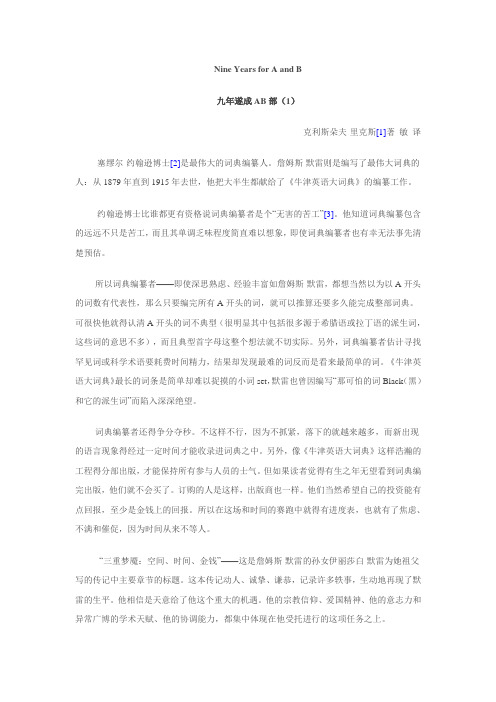
Nine Years for A and B九年遂成AB部(1)克利斯朵夫·里克斯[1]著敏译塞缪尔·约翰逊博士[2]是最伟大的词典编纂人。
詹姆斯·默雷则是编写了最伟大词典的人:从1879年直到1915年去世,他把大半生都献给了《牛津英语大词典》的编纂工作。
约翰逊博士比谁都更有资格说词典编纂者是个“无害的苦工”[3]。
他知道词典编纂包含的远远不只是苦工,而且其单调乏味程度简直难以想象,即使词典编纂者也有幸无法事先清楚预估。
所以词典编纂者——即使深思熟虑、经验丰富如詹姆斯·默雷,都想当然以为以A开头的词数有代表性,那么只要编完所有A开头的词,就可以推算还要多久能完成整部词典。
可很快他就得认清A开头的词不典型(很明显其中包括很多源于希腊语或拉丁语的派生词,这些词的意思不多),而且典型首字母这整个想法就不切实际。
另外,词典编纂者估计寻找罕见词或科学术语要耗费时间精力,结果却发现最难的词反而是看来最简单的词。
《牛津英语大词典》最长的词条是简单却难以捉摸的小词set,默雷也曾因编写“那可怕的词Black(黑)和它的派生词”而陷入深深绝望。
词典编纂者还得争分夺秒。
不这样不行,因为不抓紧,落下的就越来越多,而新出现的语言现象得经过一定时间才能收录进词典之中。
另外,像《牛津英语大词典》这样浩瀚的工程得分部出版,才能保持所有参与人员的士气。
但如果读者觉得有生之年无望看到词典编完出版,他们就不会买了。
订购的人是这样,出版商也一样。
他们当然希望自己的投资能有点回报,至少是金钱上的回报。
所以在这场和时间的赛跑中就得有进度表,也就有了焦虑、不满和催促,因为时间从来不等人。
“三重梦魇:空间、时间、金钱”——这是詹姆斯·默雷的孙女伊丽莎白·默雷为她祖父写的传记中主要章节的标题。
这本传记动人、诚挚、谦恭,记录许多轶事,生动地再现了默雷的生平。
他相信是天意给了他这个重大的机遇。
全新版大学英语阅读教程4翻译

1.The Campers at Kitty Hawk在这篇文章中,John Dos Passos运用散文和诗歌两种文学形式,讲述了莱特兄弟制造的世界上第一架飞机,这是人类历史上最重要的里程碑之一。
他还描述了杰出的莱特兄弟的生活,他们去kitty Hawk 不是为了野营,而是去完成一个听起来不可能的事情。
1903年12月17日,住在俄亥俄州代顿市霍桑街一幢木头房子里的兄弟联合会主教、曾任《宗教嘹望》报编辑的莱特先生收到了他的儿子威尔伯和奥维尔发来的电报。
他们两个突发奇想, 去北卡罗来纳州海岸沙丘上的一个小宿营地度假,给自己匆忙赶制的滑翔机做一些修补。
电文:周四早成功四次飞行,在21mile/hour 从水平面起飞,仅靠引擎力量启动,平均31mile/hour 最长57秒。
数字有点出入,因为电报员误读了奥维夫的潦字。
但事实并没改变,来自dayton,俄亥俄州的两个单车修理工设计,建造,并试飞了一架真正的飞机。
电机预热几分钟后,我松了拉住飞机在跑道的绳,飞机迎风冲去。
韦伯扶着机翼跑以保持机身的平衡,以免跑出跑道。
不像14号那天,今天电机平静的向前稳行,直面27M/H的风。
韦伯一直扶着它直到它跑了40英尺后起飞。
一个救命的摄影师拍下了它离地两英尺的一幕。
它当时刚飞到跑道尾部,飞行过程上下摇摆既不稳定,归因于空气的不平稳和驾驭经验的不足。
一个猛扎结束了它120英尺的飞行旅程。
它飞了12秒,但这是人类飞行史上第一次带人的,全程自力飞行的,过程没有减速的,且最后落点与起点等高的飞行。
晚些时候飞机遇上阵风,打了个翻,撞个粉碎,差点杀了那想把它拉下来的海防巡警。
这很不幸,但兄弟俩太高兴了,并不在意。
他们证明了那该死的东西能飞。
当所有这些尘埃落定,我们马上打包行李回家,因为我们知道飞行器时代已经到来。
他们返回家乡过圣诞。
他们的家乡位于俄亥俄州的Dayton。
他们70年代出生于此。
他们家从1840年就搬到这阿巴拉契亚山脉西面。
全新版大学英语阅读教程4(课文翻译)
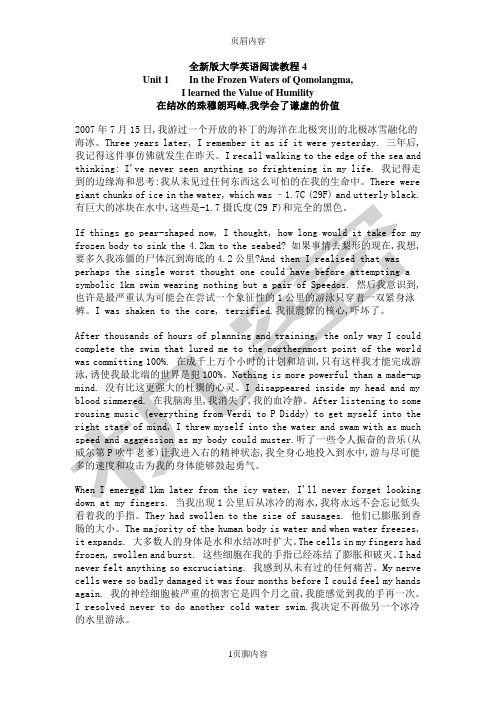
全新版大学英语阅读教程4Unit 1 In the Frozen Waters of Qomolangma,I learned the Value of Humility在结冰的珠穆朗玛峰,我学会了谦虚的价值2007年7月15日,我游过一个开放的补丁的海洋在北极突出的北极冰雪融化的海冰。
Three years later, I remember it as if it were yesterday. 三年后,我记得这件事仿佛就发生在昨天。
I recall walking to the edge of the sea and thinking: I've never seen anything so frightening in my life. 我记得走到的边缘海和思考:我从未见过任何东西这么可怕的在我的生命中。
There were giant chunks of ice in the water, which was –1.7C (29F) and utterly black.,,从看着我的手指。
They had swollen to the size of sausages. 他们已膨胀到香肠的大小。
The majority of the human body is water and when water freezes, it expands. 大多数人的身体是水和水结冰时扩大。
The cells in my fingers had frozen, swollen and burst. 这些细胞在我的手指已经冻结了膨胀和破灭。
I had never felt anything so excruciating. 我感到从未有过的任何痛苦。
My nerve cells were so badly damaged it was four months before I could feel my hands again. 我的神经细胞被严重的损害它是四个月之前,我能感觉到我的手再一次。
新标准大学英语4 课文原文及翻译

Unit 1 Active reading (1) / P3Looking for a job after university? First, get off the sofaMore than 650000 students left university this summer and many have no idea about the way to get a job. How tough should a parent be to galvanize them in these financially fraught times?今年夏天,超过65万名学生离开了大学,很多人都不知道如何找到工作。
在这个经济困难的时期,父母应该怎样严厉地激励他们呢?In July, you looked on as your handsome 21-year-old son, dressed in gown and mortarboard, proudly clutched his honors degree for his graduation photo. Those memories of forking out thousands of pounds a year so that he could eat well and go to the odd party, began to fade. Until now.7月,你看着你21岁的儿子,穿着学士服,戴着学位帽,骄傲地拿着他的荣誉学位拍毕业照。
那些为了吃得好、参加不定期的聚会而每年掏出几千英镑的记忆开始消失了。
直到现在。
As the summer break comes to a close and students across the country prepare for the start of a new term, you find that your graduate son is still spending his days slumped in front of the television, broken only by texting, Facebook and visits to the pub. This former scion of Generation Y has morphed overnight into a member of Generation Grunt. Will he ever get a job?当暑假即将结束,全国各地的学生都在为新学期的开始做准备时,你会发现,你毕业的儿子仍然整天窝在电视机前,只有发短信、上Facebook和泡酒吧。
全新版 大学英语 阅读教程4课文翻译

1、待走读生好点克里斯托夫·M·贝利托 你也许可以列出往宿家中,每天赫家和学校之间的大学走读生所享受的种森!}l}越之处。
_ 但在下面的文章中,作者试图揭示事‘清的另一面,认为走读生的生活并不如人}l!}们想像 中的那般轻松。
走读生过着一种矛盾的生活,他去学校是为了能体会一种自我探}ll}索的生 活,而实际上与父母在一起是绝对无法保持“我独立的。
你也许认为我们这些人住在家中、 每天往返学校的日子很惬意。
不用等洗衣机,牙膏用完了橱拒里有新的,更重要的是,冰箱 里塞满了食物,也不用自己付款。
不仅如此,通常还有人付电话费,即使再晚,微波炉里也 还热着食物。
你会嗤之以弃—那不是大学生活,那只是永远长不大的孩子。
也许表面上看起 来我们像被惯坏了的孩子, 但事情远没有那么简单。
住在家里的大学生过着一种矛盾的生活。
跟你们一样,我们来到大学探索自我;自我探索和有机化学一样是我们所受教育的一部分。
然而,鉴于父母监督子女的本能不会减弱,我们要保持自我独立可就不容易了。
再者,家庭 的责任也在所难免。
比方说,当父母的结婚周年纪念日正好在我们期末考试的前一天,我们 该怎么办?事实上,做一个无法脱离家庭约束的学生简直与努力跟一个你不喜欢的室友相处 一样困难。
我们的问题很复杂。
在一定程度上,我们是这个社会的二等公民。
由于你不得不 开车回家或赶最后一班车, 你很难享受俱乐部、 大学生联谊会和舞会的乐趣。
同样不幸的是, 你意识到你不能参加仅有一次的商法复习课,因为它结束得太晚。
但这还不是问题的关健: 毕竟,每个人都可以随时在朋友的宿舍里借宿。
’真正的问题在于,我们错过了那些活动, 错过了由此产生的一种友好的情嗦,这种情嗦来自于一同突击恶补工业心理学的漫漫长夜, 来自于谁跟谁上了床的瞎扯闲铆, 来自于关于 “乔治· 威尔” “亲爱的艾比” 和 的热门话题, 以及在这之后彼此对于毕业临近的真切感受的交流。
新发展大学英语阅读与写作4课文翻译Looking good by doing good寻找好行善

Looking good by doing good[Jan 15th 2009]Economics focusLooking good by doing goodJan 15th 2009From The Economist print editionRewarding people for their generosity may be counterproductiveIllustration by Jac Depczyk A LARGE plaque in the foyer of Boston’s Institute for Contemporary Art (ICA), a museum housed in a dramatic glass and metal building on the harbour’s edge, identifies its most generous patron s. Visitors who stop to look will notice that some donors—including two who gave the ICA over $2.5m—have chosen not to reveal their names. Such reticence is unusual: less than 1% of private gifts to charity are anonymous. Most people (including the vast majority of the ICA’s patrons) want their good deeds to be talked about. In “Richistan”, a book on America’s new rich, Robert Frank writes of the several society publications in Florida’s Palm Beach which exist largely to publicise the charity of its well-heeled residents (at least before Bernard Madoff’s alleged Ponzi scheme left some of them with little left to give).As it turns out, the distinction between private and public generosity is helpful in understanding what motivates people to give money to charities or donate blood, acts which are costly to the doer and primarily benefit others. Such actions are widespread, and growing. The $306 billion that Americans gave to charity in 2007 was more than triple the amount donated in 1965. And though a big chunk of this comes from plutocrat s like Bill Gates and Warren Buffett, whose philanthropy has attracted much attention, modest earners also give generously of their time and money. A 2001 survey found that 89% of American households gave to charity, and that 44% of adults volunteered the equivalent of 9m full-time jobs. Tax break s explain some of the kindness of strangers. But by no means all.Economists, who tend to think self-interest governs most actions of man, are intrigue d, and have identified several reasons to explain good deeds of this kind. Tax breaks are, ofcourse, one of the main ones, but donors are also sometimes paid directly for their pains, and the mere thought of a thank-you letter can be enough to persuade others to cough up. Some even act out of sheer altruism. But most interesting is another explanation, which is that people do good in part because it makes them look good to those whose opinions they care about. Economists call this “image motivation”.Dan Ariely of Duke University, Anat Bracha of Tel Aviv University, and Stephan Meier of Columbia University sought, through experiments, to test the importance of image motivation, as well as to gain insights into how different motivating factors interact. Their results, which they report in a new paper*, suggest that image motivation matters a lot, at least in the laboratory. Even more intriguingly, they find evidence that monetary incentives can actually reduce charitable giving when people are driven in part by a desire to look good in others’ eyes.The crucial thing about charity as a means of image building is, of course, that it can work only if others know about it and think positively of the charity in question. So, the academics argue, people should give more when their actions are public.To test this, they conducted an experiment where the number of times participants clicked an awkward combination of computer keys determined how much money was donated on their behalf to the American Red Cross. Since 92% of participants thought highly of the Red Cross, giving to it could reasonably be assumed to make people look good to their peers. People were randomly assigned to either a private group, where only the participant knew the amount of the donation, or a public group, where the participant had to stand up at the end of the session and share this information with the group. Consistent with the hypothesis that image mattered, participants exerted much greater effort in the public case: the average number of clicks, at 900, was nearly double the average of 517 clicks in the private case.However, the academics wanted to go a step further. In this, they were influenced by the theoretical model of two economists, Roland Benabou, of Princeton University, and Jean Tirole, of Toulouse University’s Institut d’Economie Industrielle, who formalised the idea that if people do good to look good, introducing monetary or other rewards into the mix might complicate matters. An observer who sees someone getting paid for donating blood, for example, would find it hard to differentiate between the donor’s intrinsic “goodness” and his greed.Blood moneyThe idea that monetary incentives could be counterproductive has been around at least since 1970, when Richard Titmuss, a British social scientist, hypothesised that paying people to donate blood would reduce the amount of blood that they gave. But Mr Ariely and his colleagues demonstrate a mechanism through which such confound ing effects could operate. They presumed that the addition of a monetary incentive should have much less of an impact in public (where it muddle s the image signal of an action) than in private (where the image is not important). By adding a monetary reward for participants to theirexperiment, the academics were able to confirm their hypothesis. In private, being paid to click increased effort from 548 clicks to 740, but in public, there was next to no effect. The trio also raise the possibility that cleverly designed rewards could actually draw out more generosity by exploiting image motivation. Suppose, for example, that rewards were used to encourage people to support a certain cause with a minimum donation. If that cause then publicised those who were generous well beyond the minimum required of them, it would show that they were not just “in it for the money”. Behavioural economics may yet provide charities with some creative new fund-raising techniques.寻找好行善[ 2009年1月15日]经济焦点寻找好行善2009年1月15日来自经济学人印刷版回报人民的慷慨可能会适得其反插图由江淮Depczyk在波士顿当代艺术学院(ICA ),装在一个巨大的玻璃和金属建筑海港的边缘博物馆大厅一个大匾,确定其最慷慨的赞助人。
新视野大学英语(第二版)第四册读写教程课文翻译

新视野大学英语(第二版)第四册读写教程课文翻译.An artist who seeks fame is like a dog chasing his own tail who, when he captures it, does not know what else to do but to continue chasing it.艺术家追求成名,如同狗自逐其尾,一旦追到手,除了继续追逐不知还能做些什么。
The cruelty of success is that it often leads those who seek such success to participate in their own destruction.成功之残酷正在于它常常让那些追逐成功者自寻毁灭。
"Don't quit your day job!" is advice frequently given by understandably pessimistic family members and friends to a budding artist who is trying hard to succeed.对一名正努力追求成功并刚刚崭露头角的艺术家,其亲朋常常会建议“正经的饭碗不能丢!”他们的担心不无道理。
The conquest of fame is difficult at best, and many end up emotionally if not financially bankrupt.追求出人头地,最乐观地说也困难重重,许多人到最后即使不是穷困潦倒,也是几近精神崩溃。
Still, impure motives such as the desire for worshipping fans and praise from peers may spur the artist on.尽管如此,希望赢得追星族追捧和同行赞扬之类的不太纯洁的动机却在激励着他们向前。
全新版大学英语快速阅读4(文章翻译)^^

Unit 1Alone in the Arctic Cold 一个人在北极严寒一天打碎了非常寒冷和灰色,当那个人偏离主要育空试验和爬上斜坡,在那里的是一个朦胧而过去向东穿过了踪迹松林之间。
坡率陡峭,而且他停顿了一下喘不过气来保持最佳的状态。
没有太阳和缕阳光,尽管他天空无云。
这是一个晴朗的日子,但在那里似乎是一个蒙上了一层水汽表面看来,把这天黑暗。
这个事实不担心那个人。
他被用来缺乏阳光。
那人回头而且他已经来了。
育空河打下英里宽藏起来了以下3英尺的冰。
这个世界上的冰一样多英尺的积雪。
这是连续的白色的,除了一个黑暗的发际线了痕迹,向南延伸达500英里去的库特关口。
但是,整个神秘,深远的发际线跟踪,没有太阳从天空,巨大的冷的,陌生和怪异的没有什么印象all-made上了的人。
他是新来的人在这地,这是他的第一个冬天。
他的问题他是缺乏想象力。
他很快和警惕在生活的一切,但只有在去吧,而不是在意义。
意思eighty-odd零下五十度学位霜。
这样的事实了冷漠,而且不舒服,就这些。
它并不带他去思考男人的一般是脆弱,能够只活在确定的限度窄的热量和冷。
零下五度代表点冰霜伤害必须提防,利用厚,暖和的衣服。
50度以下零是他就精确50度零度以下。
应该有其他东西了可那是一个思想,从来没有进过他的头上。
当他转身要走,他吐不确定。
就有一个陡坡、易爆裂纹他的震惊。
他吐了。
又一次,空气里之前,这可能下降至雪吐口唾沫裂了。
他知道五十岁的唾沫在雪地上闪现下面,但这吐口唾沫空气中闪现了。
毫无疑问这个五十个更加寒冷below-how要冷得多了不知道。
但是温度还显得无关紧要。
他注定的老我的左边叉子汉德森的孩子们在小溪了。
他们来了在山上从印度人小河的国家,虽然他来拐弯抹角看一看的可能性走出木材来源于群岛的育空。
他要在六营地点,有点天黑之后,这是真的,但男孩们会去,火灾的去,和热晚饭将为此做好准备。
他陷入水中在大松树。
踪迹减弱了。
他很高兴他没有雪橇、旅游的光。
Reading for pleasure(快乐阅读)
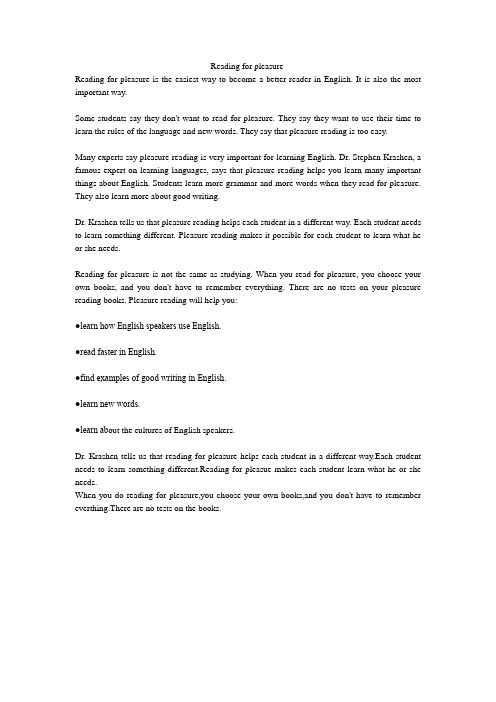
Reading for pleasureReading for pleasure is the easiest way to become a better reader in English. It is also the most important way.Some students say they don't want to read for pleasure. They say they want to use their time to learn the rules of the language and new words. They say that pleasure reading is too easy.Many experts say pleasure reading is very important for learning English. Dr. Stephen Krashen, a famous expert on learning languages, says that pleasure reading helps you learn many important things about English. Students learn more grammar and more words when they read for pleasure. They also learn more about good writing.Dr. Krashen tells us that pleasure reading helps each student in a different way. Each student needs to learn something different. Pleasure reading makes it possible for each student to learn what he or she needs.Reading for pleasure is not the same as studying. When you read for pleasure, you choose your own books, and you don't have to remember everything. There are no tests on your pleasure reading books. Pleasure reading will help you:●learn how English speakers use English.●read faster in English.●find examples of good writing in English.●learn new words.●learn ab out the cultures of English speakers.Dr. Krashen tells us that reading for pleasure helps each student in a different way.Each student needs to learn something different.Reading for pleasue makes each student learn what he or she needs.When you do reading for pleasure,you choose your own books,and you don't have to remember everthing.There are no tests on the books.。
新发展大学英语阅读与写作4课文翻译A Biology of Mental Disorder精神障碍的生物学

A Biology of Mental DisorderJun 26, 2009 8:00 PM EDTUnderstanding the biology of mental illness would be a paradigm shift in our thinking about mind. It would not only inform us about some of the most devastating diseases of humankind but, because these are diseases of thought and feeling, it would also tell us more about who we are and how we function. I naively thought we were on the verge of such a paradigm change in 1983, when James Gusella and Nancy Wexler were tracking down the gene that causes Huntington's disease. I expected that within 10 years we would have found the major genes that contribute to schizophrenia, depression, and autism. Since then, there has been a lot of enthusiasm about genes and mental illness and some false starts, but surprisingly little progress.In the past few years, however, certain advances in genetics have given us new reasons for optimism. Now that we can look at the whole human genome, there is a logic to it that we could not appreciate when looking at genes in isolation. As a result, there is reason to believe that the next 10 to 20 years will be more fruitful than the past two decades have been.One major advance has been the discovery that there is much more variability in the genome than had been anticipated, and that this takes the form of copy number variation (CNV). These are duplications or deletions of segments of a chromosome, often involving several or tens of genes, that enhance or depress the actions of specific genes. A well-known example of a CNV is the extra copy of chromosome 21 resulting in Down syndrome. It has recently been discovered that this type of variation is extremely common in everyone's genome.A specific type of CNV—called de novo mutations—may be relevant to autism. De novo mutations occur in only one tissue of the body—the sperm or egg—and may crop up relatively late in life (during reproduction), appearing only in the next generation. This fits the pattern of autism, a genetic disease that occasionally emerges in families in which the mother doesn't have autism, the father doesn't have it, and the other sibling doesn't have it. A mother and father could pass this mutation down to one of their children, even though the mutation would not appear in their chromosomes but only in their sperm or eggs. The children would now have the mutation and could pass it on from generation to generation. De novo CNVs may explain the rise in the true incidence of autism in recent years. (Autism cases have also risen in part because of better diagnostic criteria.) This class of mutation, it turns out, is more likely to occur in people who have children late in their 30s and 40s—a segment of the population that has been growing in recent years. Copy number variations and rare de novo mutations may also be a risk factor for schizophrenia.Scientists are also making progress in finding the biological markers for depression, anxiety, and obsessive-compulsive neurosis. Markers are essential to understanding the anatomical basis of mental disorders, diagnosing them objectively, and following their response to treatment, as well as perhaps preventing psychosis in those at high risk.The most convincing scientific progress in psychiatry in the past decade has had little to do with genomics. It is the rigorous, scientific verification that certain forms of psychotherapy are effective. This is perhaps not surprising. One of the major insights in the modern biology of learning and memory is that education, experience, and social interactions affect the brain. When you learn something and then remember it for a long time, it's because genes are being turned on and off in certain brain cells, leading to the growth of new synaptic contacts between the nervecells of the brain. Insofar as psychotherapy works and produces stable, learned changes in behavior, it can cause stable anatomical changes in the brain. We are now beginning to measure such changes with brain imaging. If a person with obsessive-compulsive neurosis or depression undergoes psychotherapy—and if the treatment is successful in changing behavior—the treatment will cause a reversal in the biological markers of these disorders.Taken together, these advances could open up new approaches to the treatment of depression, bipolar disorders, and schizophrenia, areas that have been at a pharmacological standstill for decades. Along the way we may also learn something about who we are.精神障碍的生物学2009年6月26日美国东部时间下午8:00了解精神疾病的生物学模式的转变将是一个在我们心灵的思考,它不仅会告诉我们一些人类最严重的疾病,但因为这些都是疾病的思想和感觉,它也将告诉我们更多关于我们是谁,我们如何运作。
全新版大学英语unit4阅读教程翻译
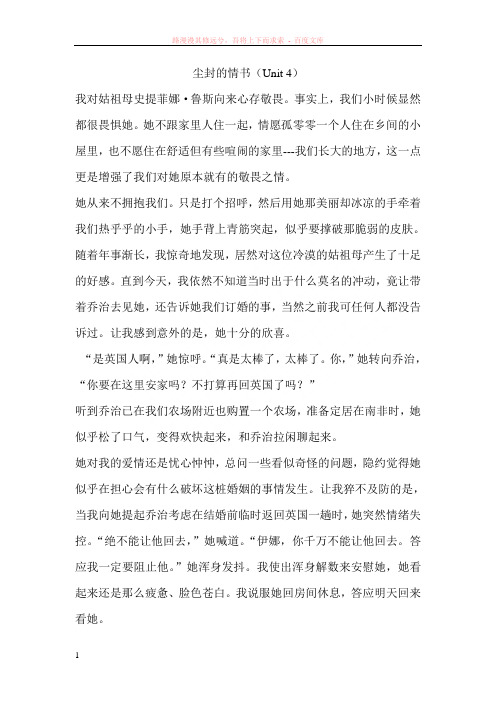
尘封的情书(Unit 4)我对姑祖母史提菲娜·鲁斯向来心存敬畏。
事实上,我们小时候显然都很畏惧她。
她不跟家里人住一起,情愿孤零零一个人住在乡间的小屋里,也不愿住在舒适但有些喧闹的家里---我们长大的地方,这一点更是增强了我们对她原本就有的敬畏之情。
她从来不拥抱我们。
只是打个招呼,然后用她那美丽却冰凉的手牵着我们热乎乎的小手,她手背上青筋突起,似乎要撑破那脆弱的皮肤。
随着年事渐长,我惊奇地发现,居然对这位冷漠的姑祖母产生了十足的好感。
直到今天,我依然不知道当时出于什么莫名的冲动,竟让带着乔治去见她,还告诉她我们订婚的事,当然之前我可任何人都没告诉过。
让我感到意外的是,她十分的欣喜。
“是英国人啊,”她惊呼。
“真是太棒了,太棒了。
你,”她转向乔治,“你要在这里安家吗?不打算再回英国了吗?”听到乔治已在我们农场附近也购置一个农场,准备定居在南非时,她似乎松了口气,变得欢快起来,和乔治拉闲聊起来。
她对我的爱情还是忧心忡忡,总问一些看似奇怪的问题,隐约觉得她似乎在担心会有什么破坏这桩婚姻的事情发生。
让我猝不及防的是,当我向她提起乔治考虑在结婚前临时返回英国一趟时,她突然情绪失控。
“绝不能让他回去,”她喊道。
“伊娜,你千万不能让他回去。
答应我一定要阻止他。
”她浑身发抖。
我使出浑身解数来安慰她,她看起来还是那么疲惫、脸色苍白。
我说服她回房间休息,答应明天回来看她。
第二天再来时,看到她坐在屋前的门廊上。
她显得如此孤独和悲凉,那是我第一次感到疑惑,为何没有男人愿意娶她,照顾她,爱怜她呢。
母亲曾告诉过我,姑祖母年轻时出落得楚楚动人,现如今除了那双褐色的眸子还残留着曾经的风韵外,昔日的美貌早已不见了踪影。
尽管如此,她还是那么娇小玲珑、惹人爱怜,凡是男人见了,都难免心生怜香惜玉之情。
她欲言又止,似乎不知从何说起。
接着她仿佛又在心底振作了起来。
“你肯定在纳闷,”她说,“为什么我听说乔治要离开你回英国会很难过。
我老了,或许老了就会胡思乱想,可我必须告诉你我的爱情故事,听完后你再来决定让未婚夫在结婚前离开究竟是不是个明智之举。
大学英语阅读教程第四册翻译

1、日光倾城,也未必温暖。
2、我失去过更珍惜拥有多庆幸我是我看住时间别让它在再流浪太适应悲伤3、每个人一生之中心里总会藏着一个人,也许这个人永远都不会知道,尽管如此,这个人始终都无法被谁所替代。
而那个人就像一个永远无法愈合的伤疤,无论在什么时候,只要被提起,或者轻轻的一碰,就会隐隐作痛4、现在执着追求的事将来必定有一天变成不重要的机器熊猫说人死的时候能带走的只有回忆我觉得回忆只是当下影响我们的感受带不走也留不下5、我想我们都只不过是一个角色。
扮演着和自己不一样的人。
什么时候,紊乱的时间能够变得整齐。
什么时候,嘈杂的声音能够变得安静。
而又是什么时候,我们能懂得以后阳光太耀眼,还有什么能够留到最后。
6、一首歌总会想起一个人,就像《左边》、我会想起米莱。
然后我会想、倘若陆涛没遇到过夏琳,米莱是否也能很幸福。
7、Never say goodbye when you still want to try当你仍想继续,永远不要说再见Never give up when you still feel you can take if当你仍然能够接受,永远不要说放弃Never say you don’t love that person anymorewhen you can’t let go当你舍不得他,永远不要说你不再爱他8、走过的的那些日子,是否已经充实过着。
在过来的岁月里,不经意的回头。
看是否会有自己舍不得忘却的东西,我常想。
会不会,经常在一个人的时候,莫明的就开始难过。
9、当丸子不再爱野比大雄当野比大雄和静香相爱当丸子再一次遇见花伦当花伦为丸子赴汤蹈火当野比大雄回头看丸子当丸子不再动摇为花伦只是没有花伦只是野比大雄离开只是静香很幸福只是丸子早就被遗忘我知道野比大雄会懂丸子的野比大雄。
10、这个冬天失去谁。
伤了谁。
我还是一如既往的手脚冰冷。
这个冬天拥有谁。
抛弃谁。
我还是一如既往的冷暖自知。
这个冬天。
我依旧是我。
全新版大学英语(第二版)4作文翻译及长句翻译

攻势已经持续了三天,但是我们并没有取得多少进展。
师长(division commander)命令我们营(battalion) 夜晚绕到敌人后方发起突然袭击。
然而,要绕到敌人后方,我们必须越过一片沼泽地(marshland)。
我们很多人担心会陷入泥潭之中。
我们营长决定冒一下险。
所幸由于寒冷天气沼泽地都结上了冰,我们于天亮前到达目的地并从敌人后方发起进攻。
这一下扭转了战局。
敌人没有戒备,不久便投降了。
The offensive had already lasted three days, but we had not gained much ground. The division commander instructed our battalion to get around to the rear of the enemy at night and launch a surprise attack. To do so, however, we had to cross marshland and many of us were afraid we might get bogged down in the mud. Our battalion commander decided to take a gamble . Lucky enough,thanks to the severely cold weather which made the marchland freeze over, we arrived at our destination before dawn and began attacking the enemy from the rear. This turned the tide of the battle. The enemy, caught off guard , soon surrendered.汽车自从发明以来使交通运输发生了革命性的变化,永远地改变了人们的生活、旅行和办事的方式。
全新版大学英语(第二版)4阅读教程高级本中文翻译
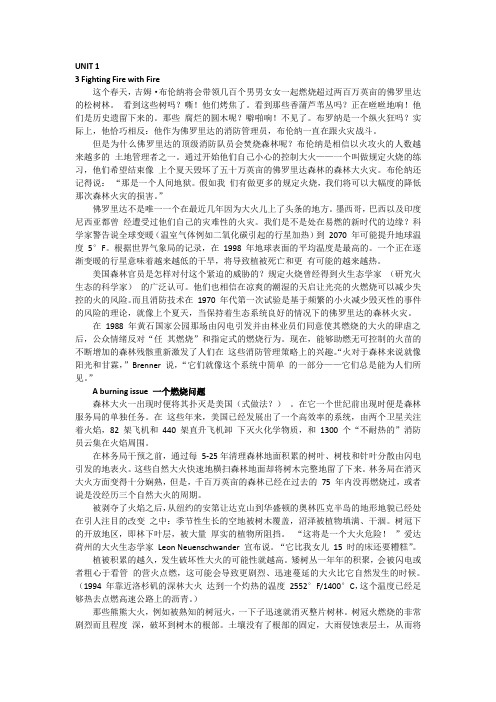
UNIT 13 Fighting Fire with Fire这个春天,吉姆·布伦纳将会带领几百个男男女女一起燃烧超过两百万英亩的佛罗里达的松树林。
看到这些树吗?嘶!他们烤焦了。
看到那些香蒲芦苇丛吗?正在咝咝地响!他们是历史遗留下来的。
那些腐烂的圆木呢?噼啪响!不见了。
布罗纳是一个纵火狂吗?实际上,他恰巧相反:他作为佛罗里达的消防管理员,布伦纳一直在跟火灾战斗。
但是为什么佛罗里达的顶级消防队员会焚烧森林呢?布伦纳是相信以火攻火的人数越来越多的土地管理者之一。
通过开始他们自己小心的控制大火——一个叫做规定火烧的练习,他们希望结束像上个夏天毁坏了五十万英亩的佛罗里达森林的森林大火灾。
布伦纳还记得说:“那是一个人间地狱。
假如我们有做更多的规定火烧,我们将可以大幅度的降低那次森林火灾的损害。
”佛罗里达不是唯一一个在最近几年因为大火儿上了头条的地方。
墨西哥,巴西以及印度尼西亚都曾经遭受过他们自己的灾难性的火灾。
我们是不是处在易燃的新时代的边缘?科学家警告说全球变暖(温室气体例如二氧化碳引起的行星加热)到2070 年可能提升地球温度5°F。
根据世界气象局的记录,在1998 年地球表面的平均温度是最高的。
一个正在逐渐变暖的行星意味着越来越低的干旱,将导致植被死亡和更有可能的越来越热。
美国森林官员是怎样对付这个紧迫的威胁的?规定火烧曾经得到火生态学家(研究火生态的科学家)的广泛认可。
他们也相信在凉爽的潮湿的天启让光亮的火燃烧可以减少失控的火的风险。
而且消防技术在1970 年代第一次试验是基于频繁的小火减少毁灭性的事件的风险的理论,就像上个夏天,当保持着生态系统良好的情况下的佛罗里达的森林火灾。
在1988 年黄石国家公园那场由闪电引发并由林业员们同意使其燃烧的大火的肆虐之后,公众情绪反对“任其燃烧”和指定式的燃烧行为。
现在,能够助燃无可控制的火苗的不断增加的森林残骸重新激发了人们在这些消防管理策略上的兴趣。
Reading for Pleasure(为快乐而读书)

Reading for Pleasure(为快乐而读书)阅读对于每一个人来说都是一件愉悦的事情。
在这篇文章中,我们将探讨为什么阅读对我们来说是如此重要,以及如何利用阅读来提高我们的自我表达能力,增强我们的学习能力,以及如何让我们的思想更加清晰和深度。
阅读为何如此重要?现在,许多人都认为阅读并不是一件令人感到愉悦的事情。
随着技术的进步,很多人现在更倾向于通过观看视频和浏览社交媒体来获取信息。
但是,我们应该记住的是,阅读是提高我们思维能力和理解力最重要的一种方式。
•阅读有助于提高我们的自我表达能力。
通过阅读大量书籍,我们能够锻炼我们的想象力和创造力。
这通过刺激我们的大脑来帮助我们更好地表达我们的想法,使我们更有说服力的表达想法。
•阅读有助于增强我们的学习能力。
知识是无穷的,阅读可以让我们更加了解世界和深度地思考问题。
同时,阅读还可以帮助我们提高我们的专注力,因为当我们专注于一本书籍时,我们可以把思维深入到书籍的细节中,这样可以帮助我们建立新的知识学习。
•阅读可以让我们思想更加清晰和深度。
书籍包含了作者的智慧,阅读书籍可以让我们更好地理解作者的观点和感受,提高我们理解作者思想的能力。
同时,我们能够在阅读中学习到思维的技巧,这有利于我们更好地解决问题和理解世界。
如何通过阅读获取快乐?许多人都认为阅读很无聊,这是因为他们从未找到有兴趣的书籍。
在选择自己喜欢的书籍时,您可以从以下几点入手:1.找到可以触动您情感的故事。
您可以从一些优秀的小说或自传中找到自己的兴趣。
2.找到您工作上或学习中需要的书籍。
例如,我的专业是数据科学,因此我也会不断阅读有关数据科学方面的书籍。
3.选择引发您好奇心和探索精神的书籍。
这些书籍可以激发我们的好奇心和探索精神,激发我们的想象力和创造力,向我们展示新的世界以及未来的可能。
对于那些开始阅读的人来说,阅读量和速度可能不会很快,也许您暂时无法掌握任何有价值的知识。
但是,如果您能够坚持下去,成功出版的书籍中一定有能够激发您乐趣的作品。
- 1、下载文档前请自行甄别文档内容的完整性,平台不提供额外的编辑、内容补充、找答案等附加服务。
- 2、"仅部分预览"的文档,不可在线预览部分如存在完整性等问题,可反馈申请退款(可完整预览的文档不适用该条件!)。
- 3、如文档侵犯您的权益,请联系客服反馈,我们会尽快为您处理(人工客服工作时间:9:00-18:30)。
Reading for Pleasure
he first thing I want to insist on is that reading should be enjoyable. Of course, there are many books that we all have to road, either to pass examinations or to acquire information,from which it is impossible to extract enjoyment. We aro reading them for instruction, and the best we can hope is that our need for it will enable us to get through them without todium. Such books wo read with resignation rather than with alacrity. But that is not the sort of roading I have in mind. The books I shall mention in due course will help you neither to get a degree nor to earn your living, they will not teach you to sail a boat or get a stalled motor to run, but they will help you to live more fully. That, however, they cannot do unless you enjoy reading them.
Every man is his own best critic. Whatever the learned say about a book, however unanimous they are in their praise of it,unless it interests you, it is no business of yours. And you who read are the final judge of the value to you of the book you are reading. We are none of us exactly like everyone else, only rather like, and it would be unreasonable to suppose that the books that have meant a great deal to me should be precisely those that will mean a great deal to you. But they are books that I feel the richer for having read, and I think I should not be quite the man I am if I had not read them. No one is under an obligation to read poetry or fiction or the miscellaneous literature which is classed as belleslettres. He must read them for pleasure, and who can claim that what pleases one man must necessarily please another?
为快乐而读书
我想坚持的第一点是,阅读应当是愉悦的。
自然,我们每一个人都会为了通过考试,或是为了获取信息而阅读大量的书籍。
从这样的阅读中我们无法获取快乐。
我们读这些书是为了接受教育。
我们最多只能希望自己对这些书籍的需要使得我们在读完之后不至于感到单调乏味。
这样的书,我们读得无可奈何而不是轻松愉快。
然而,我心目中的阅读不属于这一种。
我在下面很快将要提到的那一类书既不能帮助你获取学位,也不能帮助你挣钱谋生,更不能教会你驾驶船只或修好出了故障的马达,然而,它们能够帮助你活得更加充实。
而这一点,除非你喜欢阅读它们,否则是无法做到的。
每个人都是他自己最好的评论家。
无论什么学者对某一本书说了些什么,无论他们如何众口一词地对它大加称赞,倘若它激不起你的兴趣,那么这本书就与你毫不相干。
作为读者,你是你所读书籍价值的最终仲裁人。
我们当中,没有一个人跟另外一个人完全相像,至多有点相像而已。
想当然地认为对我来说很有价值的书恰恰对你也很有价值,这是不合情理的。
但是这些书的特点是:在读完之后,我感到更加充实了,我觉得要是没有读它们,我就不会成为现在的我。
没有什么人非要去阅读诗歌、小说以及其他归为“纯文学”的作品不可。
读者阅读这些作品必然是为了获取快乐;而谁又能说,使一位读者感到愉悦的书一定会让另一位读者喜欢呢?。
